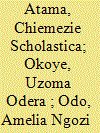| Srl | Item |
| 1 |
ID:
172353


|
|
|
|
|
| Summary/Abstract |
Despite the benefit of modern contraception, its use remains low in Nigeria. This study examined belief system as a barrier to the use of modern contraceptives among the Idoma of Benue State, North Central Nigeria. Questionnaire (n = 1107), in-depth interview (n = 6) and focus group discussion (n = 52) were used to collect data from three local government areas (LGAs). The results showed high levels of knowledge (88.0%), however, only 37.8% used modern contraceptives. The male condom had the highest percentage use (56.7%). Chi-square results showed that LGA, education and occupation were significantly related to the use of modern contraceptives. Being of greater age increased the likelihood of use, whereas higher levels of education and income decreased the likelihood of modern contraceptive use (p < 0.05). Qualitative data indicated that married women were expected to eschew modern contraceptives due to their belief in Alekwu, the community deity. Designing interventions that are culturally specific could promote use of modern contraceptives among the group.
|
|
|
|
|
|
|
|
|
|
|
|
|
|
|
|
| 2 |
ID:
172100


|
|
|
|
|
| Summary/Abstract |
This conceptual review examines institutional parameters that underpin farmer–herder conflicts in Tivland of Benue State, Nigeria. Anchored on the theory of New Institutionalism, it argues that tensions and conflicts between Tiv-farmers and the Fulani-herdsmen is occasioned largely by the disarticulation of the traditional institutional norms/rules of interaction by formal political institutions expressed in land use laws, West African sub-regional protocol, human rights provision of the Nigerian constitution and the Benue State law on anti-grazing. In these contrasting institutional forms, the formal political institution is prioritised by the state while farmers and herders are divided about the institutional basis of their coexistence. Farmers who host the herdsmen demonstrate preference for traditional norms of land ownership and control while the herdsmen incline towards new political/legal instruments which they interpret, purports to give them access to grazing lands and hence an alibi for rejecting institutions that contradict their claim to access spaces for pastoralism. Thus, persisting claims to the exercise of rights to freedom of movement and access to grazing land as opposed to claims to traditional rights of ownership and control of ancestral lands explain the origin and continuity of the farmer–herder conflicts in Benue state, Nigeria.
|
|
|
|
|
|
|
|
|
|
|
|
|
|
|
|